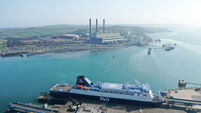Climate change a bigger threat to humanity than 'science fiction' predictions on AI, UCC scientist says

'Technology has certainly developed at a considerable pace, but there's still a long way to go before we see the kind of changes that have been predicted.'
Hype around artificial intelligence’s threat to humanity is “overstated”, and people should be far more worried about climate change, according to one of the world’s leading AI experts.
Barry O’Sullivan, a professor at University College Cork’s School of Computer Science, also believes it is “foolhardy” to think AI is anywhere near being capable of always successfully completing even basic, mundane tasks.
CLIMATE & SUSTAINABILITY HUB













